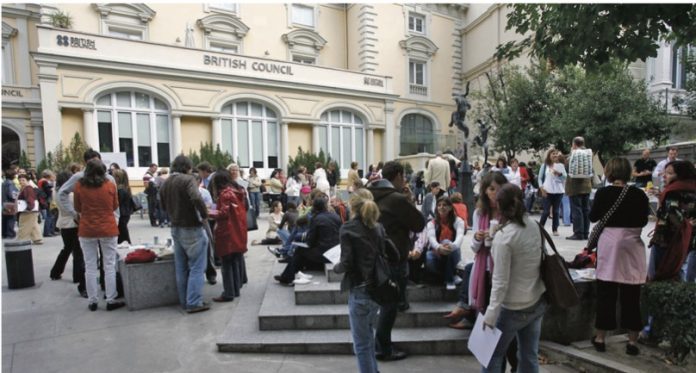The British Council, one of the world’s biggest providers of English language courses and teacher training, has been saved from bankruptcy by an emergency injection of £60 million from the UK’s Foreign and Commonwealth Office.
The money, which is in addition to the £28 million paid in May following an outcry in Parliament, will only cover the Council’s operating costs until mid-August, according to press reports, and its long-term prospects remain unclear.
The Council, which has remained largely silent in the face of the political storm, has launched an online learning project offering courses for young learners, general English and IELTS preparation. A Council spokesperson told the Gazette that 85,000 of its existing students had been moved online. “To achieve this, we accelerated the online English language teaching and learning solutions we were already piloting,” the Gazette was told.
In 2018-19, British Council teaching centres had some 420,000 students enrolled, according to their last published accounts.
Somewhat unusually, the campaign to save the Council has been led by the Public and Commercial Services (PCS) Trade Union, which represents many British Council staff. The Union has lobbied parliament, fed information to the press and set up a petition to save the Council on 38degrees.org.
According to the PCS, since the closure of 90 per cent of its teaching centres during the pandemic, the Council has been losing £40 million a month. Approached by the Gazette, the Council declined to correct or deny the figure, commenting only that “like thousands of organisations around the world,” it was, “in a very difficult financial situation as a result of Covid-19.”
A spokesperson did confirm that over 90 per cent of the English and Exams operation had been forced to close, adding, “we are now re-opening our centres where it is safe to do so.”
In 2018-2019, the Council turned over £1.25 billion, the spokesperson confirmed. Roughly 15 per cent, or £184 million, was government funding and of that, 145 million was ring-fenced for development activity. This leaves them heavily dependent on income generated by the English and Exams Department, which came to £727 million last year, including £125 million in exams fees that were remitted through to UK exam bodies.
As a non-governmental organisation and a registered charity, the British Council is not- for-profit but has generated income from its language schools since the first ones were established in 1938.
“Our English and Exams business is not supported by our … funding from the UK government,” their spokesperson explained. “Our work in this area is part of our charitable mission, which, while profitable, is run on a not-for-profit basis: we reinvest the commercial surpluses back into our non-commercial activities in support of building connections, understanding and trust between the UK and other countries.”
The same would appear to be true of their new online courses, which may raise eyebrows among UK language schools – many of whom have also been forced online by the Covid-19 crisis. The Council, which administers the UK language centre accreditation scheme on a cost-covering basis, has an agreement not to run schools in Britain.
Asked if running online courses was not a conflict of interest, the spokesperson responded: “As a result of the pandemic, we accelerated our online teaching solutions to meet the needs of learners. Many institutions, both in the UK and overseas, have done the same.”
“While continuing to offer online learning solutions, we’re eager to see students return to the UK’s accredited English language centres and strongly believe in the value of studying there,” they added.
Even if it survives, the Council is facing significant cuts. In a letter to the PCS Union a Foreign Office official warned that the British Council should review its financial position and opportunities to “make efficiencies to ensure it can continue to operate and trade.”
The Union is “concerned that the government will attach conditions to any further additional funding granted.” In addition to ‘structural changes,’ the PCS warns of potential political interference.
In a statement, it calls for the Council to be “allocated sufficient funding to continue operating independently of ministerial control.”
“Its arm’s-length relationship to government is an important factor in its global success,” it added.





